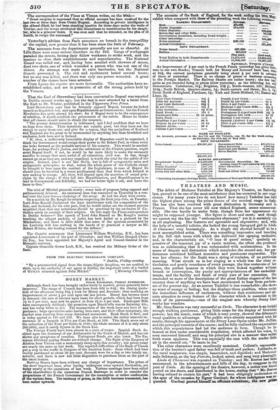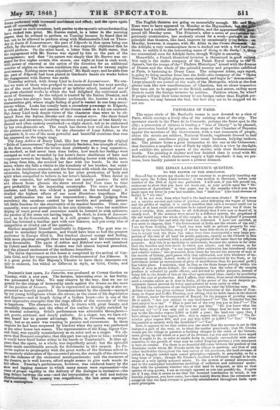THEATRES AND MUSIC.
The clibfit of Madame Tadolini at Her Majesty's Theatre, on Saturday last, proved to be one of the most satisfactory that has occurred in our expe- rience. For many years (we do not know how many) Tadolini has held the highest place among the prime donne of the musical stage in Italy. She has also been received with great distinction in Germany and in France. That she has never till now visited England, seems unaccount- able. She can hardly be under forty, though from her appearance she might be supposed younger. Her figure is short and stout; and though we cannot say she has the "embonpoint channant," yet it is certainly not at all tmpleasing. Her features are agreeable and expressive; and, with the help of a tasteful toilette, she looked the young Savoyard girl in Linda di Chamouni very becomingly. As a singer she showed herself to be a most accomplished artist. There was something impressive and touching in the full rich tones with which she delivered her opening recitative; and, in the characteristic air, "0 ince di quest' anima," quaintly a- pressive of the innocent joy of a runic maiden, the effect she produced was so exhilarating that it was redemanded with acclamations. In the scene of despair and distraction which concludes the second act, her per- formance combined brilliant execution and passionate expression. This was her climax; for the finale was a string of roulades, of no particular meaning. What struck us in her singing as a whole was the clear ar- ticulation and pearly roundness of every passage, the fine sostenuto of her tones, the perfect manner in which they were linked together without breach or interruption, the purity and appropriateness of her embellish- ments, and the facility and finish of every part of her execution. She reminded us more of the descriptions of the great Italian singers of the last century than of anything we have been accustomed to hear from perform- ers of the present day. As an actress Tadolini is less remarkable: she shows no want of energy or feeling; but she displays these qualities, when under the immediate influence of excitement, without that continuous and mi- nute attention to every feature of the character which is essential to the truth of its personation,—one of the magical arts whereby Jenny Lind works her wonders.
Mr. Sims Reeves was very successful as Carlo. The character is an
enough walking gentleman, giving little scope for the display of histrionic powers; but the music, some of which is very pretty, showed the &butentl vocal qualities to advantage. The public were already acquainted with Ins merits, through his appearances at the Drtuy Lane Opera under Mr. Jull.03, and the principal concerts of the season; and he fully realized the expectations which this acquaintance had led the audience to form. Though he la- boured at first under considerable trepidation, which affected his voice, he soon recovered himself, and sang his principal airs in a manner that called forth warm applause. This was especially the case with the tender little air in the second act, "Sc tanto in ira." The other characters were excellently sustained. Colletti's representa- tion of the heroine's aged father was full of truth and pathos; LaMothe, Si the rural magistrate, was simple, benevolent, and dignified; and Mademoi- selle Schwartz, as the boy Pierotto, looked, acted, and sang very pleasingly.
Linda di Chamouni was repeated on Tuesday : and Mr. Reeves had been announced, in the advertisements and bills of the day, to reappear in the part of Carlo. At the opening of the theatre, however, a notice was found posted on the doors, and distributed in the house, stating that" Mr. Reeves having refused to sustain his part," it had been obligingly undertaken on the spur of the occasion by Signor Gardoni ; for whom indulgence waa.re- quested. Gardoni proved himself an efficient substitute; the new prilzs
donna performed with increased confidence and effect; and the opera again went off exceedingly well. As usual on such occasions, both parties totheoperatic misunderstanding have rushed into print. Mr. Reeves stated, in a letter in the morning Parrs' that he refused to perform on Tuesday because he found that he was not to be allowed to perform along with Mademoiselle Lind on Thurs- day in bode dll Lammermoor; the part of Edgardo in that opera being one which, by the terms of his engagement, it was expressly stipulated that he should perform. On the other hand, a letter from Mr. Balfe states, that the engagement with Mr. Reeves was signed by him on the part of the management ; and that "its nature was simply that Mr. Reeves was en- gaged for five nights certain this season, one night at least in each week, with power of renewal at the option of the direction for an additional number of nights on the same conditions this year, and for twenty nights next season. Nothing more was stipulated," Mr. Balfe says; and he adds that the part of Edgard() had been placed in Gardoni's hands six weeks before the engagement with Reeves was made. Thursday arrived, with Jenny Lind in Lucia di Lammermoor. We con- fess we were of those who grudged to see announced for her next novelty, one of the most hackneyed pieces of an inferior school, instead of one of the great classical works in which she had delighted the cultivated audi- ences of Germany. As the subject is treated by the Italian librettist, and as the piece has always been hitherto performed; the heroine is a weak, characterless girl, whose single feeling of grief is vented in one long mono- tonous whine. Lucia has usually been a secondary personage to Edgardo, in whom all the force and passion of the drama (m* as it is) are centered. But Jenny Lind took deeper views of the character than were to be ob- tained from the Italian libretto and the musical score. She there found incidents and situations, involving emotions and passions at best faintly in- dicated and often entirely overlooked—a slight sketch, left to be elaborated by her own.rjramatic art. The result has shown bow well she knew how the picture could be coloured; for the character of Lucy Ashton, as she represents it, is one of the most powerful and beautiful creations that ever has appeared on the tragic stage.
The Lucy Ashton of Jenny Lind, like her true prototype the original "Bride of Lammermoor," though exquisitely feminine, has strength of mind. In the first scene, where the lovers meet previously to a long separation, she marked, as had never been done before, how much her feelings were outraged as well as wounded by her lover's fierce ebullitions of hate and vengeance towards her family, by the shuddering horror with which, turn- ing away from him, she covered her face with her hands. In the next scene, where she falls a victim to the treachery of her brother, her resist- ance to his insidious counsels, and the firmness with which she repulsed his calumnies, heightened the contrast to her utter prostration of body and spirit when compelled to believe in her lover's falsehood. When forced to sign the contract, her self-sacrifice was not tamely passive: the wild and almost fierce glances she threw around her from time to time gave probability to the impending catastrophe. The scene of despair, madness, and death, was without a parallel on the musical stage; it rivalled the highest efforts of our most illustrious tragedians. Her vocal performance was not less transcendent ; though (judging from ourselves) the emotions excited by her terrible and pathetic picture left little freedom for the observation of its musical beauties. These, con- sequently, were most perceptible in her aria d'intrata; when her matchless display of vocal power and execution could, be listened to with calmness, the passion of the scene not having begun. In short, in Lucia di Lammer- moor, as in La Sonnanzhula, and in a still greater degree, Mademoiselle Lind has invested a familiar part with new features, and put every idea of competition or rivalry out of the question.
Gardoni acquitted himself excellently in Edgardo. The part was re- duced to secondary importance, and would have been so had the greatest performer in Europe filled it. But Gardoni showed energy and feeling, with more physical strength than we had expected; and his reception was most favourable. The parts of Ashton and Bidebent were well sustained by Coletti and Bouche. The theatre was fall almost beyond precedent, and the pleased excitement of the audience boundless.
The ballet department at this house is completed by the arrival of Car- lotta Grisi, and her reappearance in the divertissement of Lea Elenzena. It is a great point for Her Majesty's Theatre to have three danseuses not only so eminent, but withal so different in style, as Grisi, Cerito, and Rosati.



























 Previous page
Previous page